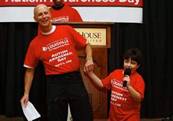Autism rally puts focus on disorder, treatment
By Laura Ungar • lungar@courier-journal.com • April 5, 2008
As a young child, Cameron Blackwell couldn't stand loud noises, paced all the time and had trouble socializing with other children.

WHAS radio personality Terry Meiners was surprised when Dallas Derringer, 10, grabbed the microphone from him and addressed the audience at an Autism Awareness Day event yesterday at the Galt House
Today, the 16-year-old Jeffersonville , Ind. , boy with Asperger's syndrome speaks about autism across the nation, has lots of friends, plays French horn in his high school band and is thinking about studying music education in college.
"If I can do it, so can anyone else with autism," Cameron told a crowd at the Galt House recognizing Autism Awareness Day yesterday. "They have the potential to do great things."
Cameron, whose disorder is considered to be on the higher-functioning end of the autism spectrum, makes public presentations with his 9-year-old brother, Jordan, who also has autism. They were two of the speakers at a rally that also included rousing music by the University of Louisville 's Pep Band and a performance by the school's cheerleaders.
All were there to lend support to parents, teachers and others caring for children with a brain disorder that affects about one in 150 children nationwide. Autism cases in Kentucky have risen drastically in recent years, from 1,500 in 1990 to more than 24,000 today.
"Getting help early is a very important thing," Jordan said. "If the parents start to lose hope, the child will lose hope."
In addition to inspiring parents, yesterday's rally recognized U of L autism programs, such as the Systematic Treatment of Autism and Related Disorders, or STAR, an intervention program housed in U of L's department of pediatrics.
Tina Davis of Louisville said her 14-year-old son Terrance's autism symptoms improved through treatment in STAR. She said one helpful technique involved showing him a video of his problem behaviors, such as sticking his fingers in his ears, then showing him an edited video of correct behavior.
"We want to make everybody in Louisville aware of autism," Davis said, her son standing at her side. "It's being diagnosed more and more. … The more people know, the more legislators know, the better."
Researchers at U of L are making strides in understanding and developing new treatments for the disorder. One experimental treatment involves pulsing a low-frequency magnetic field around people's brains. This is showing promise in reducing hyperactivity, sensory overload and repetitive behaviors.
The treatment, called transcranial magnetic stimulation, is still in the early testing stages. Ten patients received 20-minute treatments twice a week for five weeks.
Researcher Manuel Casanova, a neuroscientist taking part in the transcranial magnetic research, showed in previous studies that structural differences between autistic and normal brains contribute to autism symptoms, including social, sensory and communication problems.
"Research is going strong," Casanova said. "Autism is a brain condition, not a mind condition."
Reporter Laura Ungar can be reached at (502) 582-7190.
http://www.courier-journal.com/apps/pbcs.dll/article?AID=/20080405/NEWS01/804050436
|
